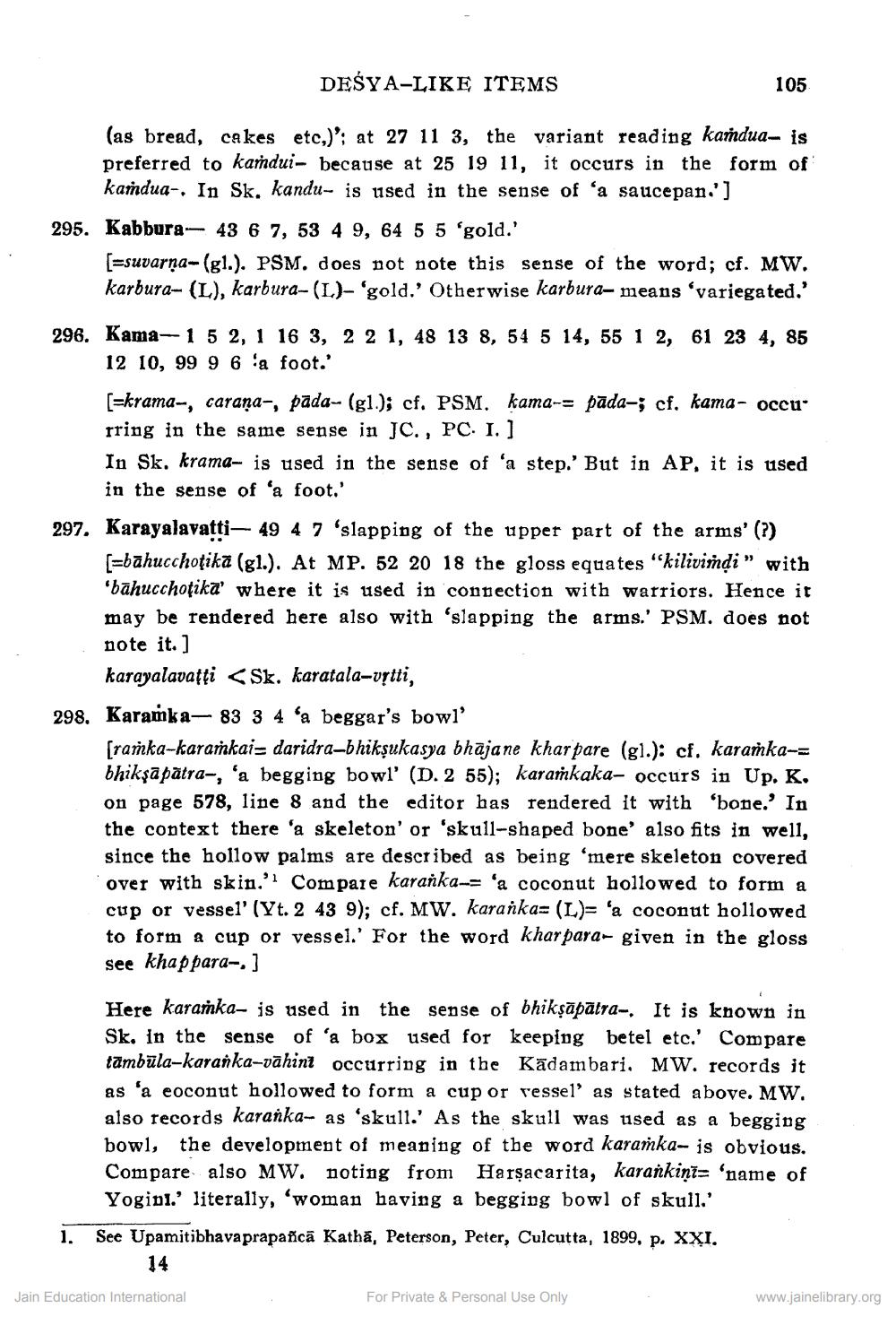________________
DEŚYA-LIKE ITEMS
105
(as bread, cakes etc,)'; at 27 11 3, the variant reading kaṁndua- is preferred to kardui- because at 25 19 11, it occurs in the form of
kaṁdua-. In Sk. kandu- is used in the sense of 'a saucepan.'] 295. Kabbura- 43 6 7, 53 4 9, 64 5 5 'gold.'
[=suvarna-(gl.). PSM. does not note this sense of the word; cf. MW. karbura- (L), karbura-(L)- 'gold.' Otherwise karbura, means 'variegated.'
296. Kama- 1 5 2, 1 16 3, 2 2 1, 48 13 8, 54 5 14, 55 1 2, 61 23 4, 85
12 10, 99 9 6 a foot.' [=krama-, carana-, pada- (gl.); cf. PSM. kama-= pāda-, cf, kama- occu* rring in the same sense in JC., PC. I. ] In Sk. krama- is used in the sense of 'a step.' But in AP, it is used in the sense of a foot.'
297. Karayalavatti — 49 4 7 'slapping of the upper part of the arms' (?)
[=bahucchotika (gl.). At MP. 52 20 18 the gloss equates "kilivimdi” with 'bahucchoţika' where it is used in connection with warriors. Hence it may be rendered here also with 'slapping the arms.' PSM. does not note it.]
karayalavatti <Sk. karatala-vītti, 298. Karamka- 83 3 4 'a beggar's bowl'
framka-karamkai= daridra-bhikṣukasya bhajane khar pare (gl.): cf. karaṁka-= bhiksa pătra-, 'a begging bowl' (D. 2 55); karamkaka- occurs in Up. K. on page 578, line 8 and the editor has rendered it with 'bone.' In the context there 'a skeleton' or 'skull-shaped bone' also fits in well, since the hollow palms are described as being 'mere skeleton covered over with skin.'' Compare karańka-- 'a coconut hollowed to form a cuo or vessel' (Yt. 2 43 9); cf. MW. karanka= (L)= 'a coconut hollowed to form a cup or vessel.' For the word khar para- given in the gloss see khappara-, ]
Here karamka- is used in the sense of bhikṣāpātra-. It is known in Sk, in the sense of 'a box used for keeping betel etc.' Compare tambüla-karanka-vähint occurring in the Kādambari. MW. records it as 'a eoconut hollowed to form a cup or ressel' as stated above. MW. also records karanka- as 'skull.' As the skull was used as a begging bowl, the development of meaning of the word karaska, is obvious. Compare also MW. noting from Harşacarita, karankiņī= 'name of Yogipi.' literally, 'woman having a begging bowl of skull.'
1. See Upamitibhava prapanca Kathă, Peterson, Peter, Culcutta, 1899, p. XXI.
14 Jain Education International
For Private & Personal Use Only
www.jainelibrary.org




